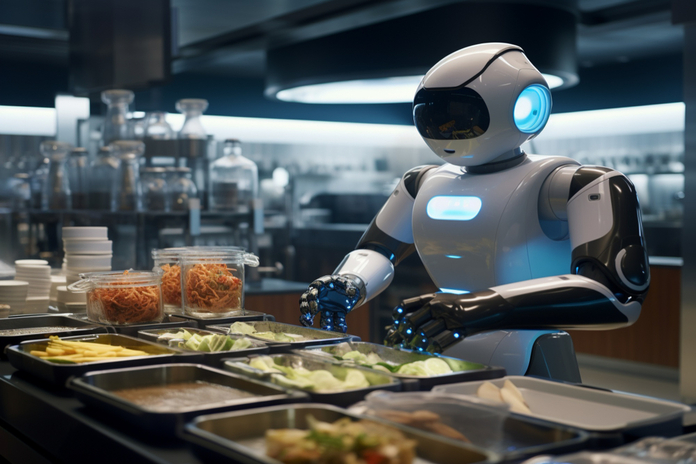As consumers demand quicker service and more affordable prices, leading fast-food chains are turning to restaurant automation to streamline operations and cut costs. Companies like Sweetgreen (NYSE:SG), Chipotle (NYSE:CMG), and Shake Shack (NYSE:SHAK) are increasingly adopting robotic technologies to handle everything from salad preparation to burger delivery, significantly impacting their operational efficiency.
Sweetgreen’s Infinite Kitchen: A Game Changer
Sweetgreen, a leader in the fast-casual dining space, is at the forefront of restaurant automation with its innovative Infinite Kitchen concept. Launched in Illinois in May 2023, Sweetgreen’s Infinite Kitchen utilizes a series of automated dispensers to prepare salad bowls in as little as three and a half minutes. According to Sweetgreen CEO Jonathan Neman, this technology not only speeds up service but also improves food quality and portion control.
The company’s initial pilot store was such a success that Sweetgreen has already expanded to three Infinite Kitchens and plans to open seven more by the end of the year. Additionally, the company aims to retrofit two to three existing restaurants with this technology, demonstrating its commitment to automation.
At its New York Penn Plaza location, the Infinite Kitchen showcased its potential by producing up to 500 bowls per hour, all while requiring just a third of the employees compared to traditional stores. This reduction in manual labor has led to a 45% decrease in employee turnover, a significant advantage in an industry plagued by high attrition rates.
Chipotle’s Robotic Revolution
Chipotle has also embraced restaurant automation, albeit with some challenges. In 2022, the company introduced Chippy, a tortilla-making robot designed to streamline the preparation process. However, former CEO Brian Niccol, who recently transitioned to lead Starbucks, acknowledged that Chippy did not meet the company’s expectations.
Undeterred, Chipotle introduced its latest innovation, Autocado, in July 2023. This robot is designed to peel and core avocados, a critical task in the preparation of Chipotle’s famous guacamole. Autocado is currently in its third iteration and is expected to enhance efficiency significantly once fully integrated into the company’s operations.
Moreover, Chipotle has also introduced a digital makeline, where burrito bowls and salads travel along a conveyor belt while ingredients are automatically dispensed. These innovations are currently undergoing final checks before being pilot tested in a restaurant, signaling Chipotle’s ongoing commitment to leveraging technology to improve service.
White Castle and the Evolution of Flippy
White Castle, a pioneer in the fast-food industry, has also jumped on the restaurant automation bandwagon. The chain first introduced Flippy, a robotic assistant that automates the frying process by filling the fryer basket with potatoes, dunking it in oil, and removing the fries once cooked.
White Castle has since upgraded to Flippy 2, which is being tested in 18 of its restaurants. The company’s smaller, family-owned structure allows it to make real-time improvements to the robot, enhancing its efficiency and reliability.
Miso Robotics, the developer behind Flippy, believes that robots are the future of fast food. CEO Rich Hull argues that with rising labor costs, automation will become increasingly necessary for restaurants to remain profitable. By automating repetitive and physically demanding tasks, workers can be reallocated to higher-value positions, justifying higher wages and improving overall job satisfaction.
Shake Shack’s Autonomous Delivery Robots
Shake Shack (NYSE:SHAK) is another company embracing automation, particularly in the realm of delivery. The fast-casual chain has partnered with Serve Robotics to deliver its Uber Eats orders using autonomous delivery robots in Los Angeles.
Serve Robotics CEO Ali Kashani highlighted the effectiveness of these robots, stating that they complete deliveries at a higher rate than human couriers, with a success rate of 99.94%. This high level of efficiency not only enhances customer satisfaction but also reduces delivery costs, making it a win-win for both Shake Shack and its customers.
The Future of Restaurant Automation
As labor costs continue to rise and consumer expectations shift towards faster service, restaurant automation is poised to become a dominant force in the fast-casual and quick-service restaurant industries. Companies like Sweetgreen, Chipotle, White Castle, and Shake Shack are leading the charge, using technology to revolutionize how food is prepared and delivered.
With the continued advancement of automation technologies, the future of dining could look very different. As robots take on more tasks, restaurants will be able to offer faster, more consistent service, ultimately benefiting both businesses and consumers alike.
Featured Image: Freepik



